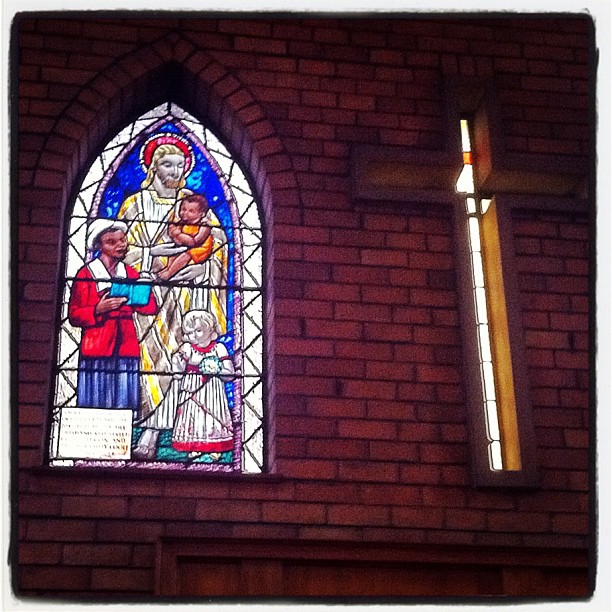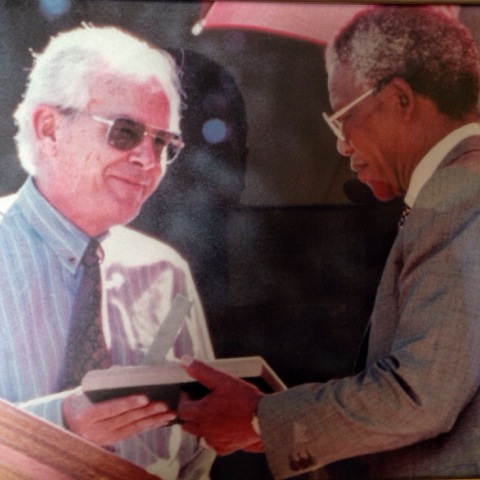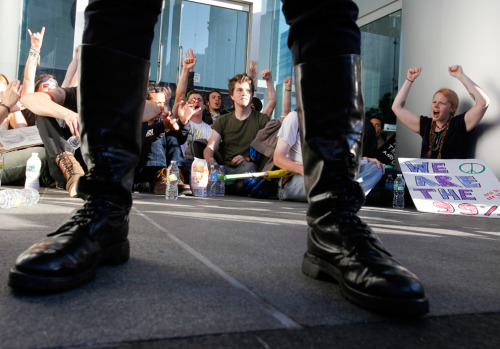For the last week or so I have been reading Ranulph Fiennes amazing book 'My Heroes' (see the link below).
It tells the stories of various brave and courageous women and men who did extraordinary things in face of great danger and hardship.
The story that most moved me was that of hotelier Paul Rusesabagina - the man who saved just over a thousand Rwandans from the genocide that ripped that nation in 1994. I was moved to tears by the tales of women and children who were violently and brutally hacked to death by family and friends in a killing frenzy that spread through the land that year.
 Germiston Methodist Church - Stained Glass WindowThis weekend I was privileged to spend the weekend with my friend Andrew Evans, a wonderful minister of a Methodist Church in the inner city of Germiston. He is doing such great work in his Church, Gospel work, building bridges between diverse communities, offering new life and hope to refugees and inner city citizens, and an ongoing place of identify and safety to the longstanding members of his congregation. In the Sunday service where I preached yesterday we sang and prayed in Shona, Xhosa, Sotho, Afrikaans and English. It felt a little like heaven.
Germiston Methodist Church - Stained Glass WindowThis weekend I was privileged to spend the weekend with my friend Andrew Evans, a wonderful minister of a Methodist Church in the inner city of Germiston. He is doing such great work in his Church, Gospel work, building bridges between diverse communities, offering new life and hope to refugees and inner city citizens, and an ongoing place of identify and safety to the longstanding members of his congregation. In the Sunday service where I preached yesterday we sang and prayed in Shona, Xhosa, Sotho, Afrikaans and English. It felt a little like heaven.
As I travelled home last night I had Fiennes book and the Church service on my mind. Of course most of the Shona speaking members of Andrew's congregation come from Zimbabwe - they have fled physical and economic hardship in search of a better life in South Africa. They come here, even though South Africa has experienced xenophobic violence in the last few years as desperate citizens of this nation fear that foreigners are taking their jobs and land. Still, the prospects here are better.
Andrew is a good minister - he is doing the work of reconciliation and bringing about unity and peace in his community. It is the work of Christ the reconciler.
In Fiennes' book he notes, among other things, that the conditions that are necessary for genocide to occur include:
- An impoverished population
- A large gap between those who 'have' and those who 'do not have'
- A clearly identifiable minority grouping that has access to wealth and power
- The development of a racial or ethnic ideology that places groups of persons in opposition to one another
- Corrupt, power hungry and irresponsible politicians
I wondered how many of these elements could be ticked off a list of criteria in South African society? We have much work to do in order to bring equality, overcome animosity, and combat false and harmful racial and ethnic ideologies.
For some years I was an involuntary soldier - as many of South Africa's white males were before the end of Apartheid. I was conscripted to military service. I was supposed to go straight from school. However, since I first went to study my conscription was delayed some years. My life changed during that time. As I think back on it now that was the period during which I went from being a boy to becoming a man. I can clearly see how my innocence was eroded by the might of the military machine.
The memories and emotions, expresssed above, have been washing through my mind, finding place in my prayers, and space for contemplation and understanding before God.
I pray that young women and men may grow to adulthood without having to face the brutality of war. I pray that in my own land we should find another as sisters and brothers and work together for transformation and justice for all. I pray 'Still let me live as Love and Life are one: Still let me turn on earth a child-like gaze..."
Wishes of Youth
Gaily and greenly let my seasons run:
And should the war-winds of the world uproot
The sanctities of life, and its sweet fruit
Cast forth as fuel for the fiery sun;
The dews be turned to ice—fair days begun
In peace wear out in pain, and sounds that suit
Despair and discord keep Hope’s harp-string mute;
Still let me live as Love and Life were one:
Still let me turn on earth a child-like gaze,
And trust the whispered charities that bring
Tidings of human truth; with inward praise
Watch the weak motion of each common thing
And find it glorious—still let me raise
On wintry wrecks an altar to the Spring. - Samuel Blanchard
 Wednesday, June 10, 2020 at 5:02PM
Wednesday, June 10, 2020 at 5:02PM 




